|
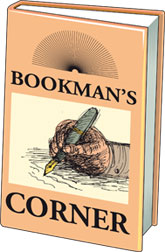
Two remarkable classical Japanese film scripts in English
Reviewed by Ranga CHANDRARATHNE
The translation of two classical Japanese film scripts by Kinugasa
Teinosuke, for the first time into English from Japanese, by Prof. Ariya
Rajakaruna will fulfil a knowledge gap in the study of Japanese films in
English.
A Crazy Page (Kurutta Ippeiji, 1926) and Crossroads (Jujiro, 1828)
mark an important millstone in the evolution of modern Japanese film.
Although much has been written about the films and of the filmmaker,
until Prof. Rajakaruna translated them from Japanese into English, the
original film scripts were not available in languages other than
Japanese.
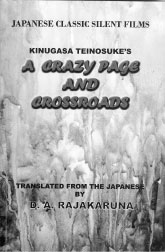 |
|
A crazy Page and
Crossroads
Author:
Prof. D.A.Rajakaruna |
Kinugasa Teinosuke (1896-1982), a contemporary of Mizoguchi Kenji,
Ozu Yasujiro and Kurosawa Akira, is one of the important filmmakers in
Japanese cinema. He is considered as a pioneer of Modernism in Japanese
cinema.
The formation of the New Sensationalist Motion Picture League by
Kinugasa and others of the New Sensationalists group (Shin –Kankaku-ha)
marked an important development of the evolution of Modernism in
Japanese cinema.
It was the New Sensationalists Motion Picture League which produced
series of films in the new mould including A Crazy Page which was also
known as A page Out of Order; A Page Out of Place or A Page of Madness.
Although Kinugasa himself said that the idea for the film was conceived
following his visit to Matsuzawa Mental Hospital at Setagaya in Tokyo,
similarities were found between A Crazy Page and the German
Expressionist film The Cabinet of Dr Caligari. Remarkably both films
were based on incidents taking place in a mental hospital. However, it
was said when A Crazy Page was made in Japan, The Cabinet of Dr
Calligari has not been shown in Japan.
The story of the film revolves around the life of an old man who
serves as an attendant in the mental hospital. In his youth, the old man
used to work as a sailor and goes abroad in search of a better life
deserting his wife and daughter. After longs years in abroad when the
sailor returns to his motherland, he finds that his wife is warded in a
mental hospital. He joins the hospital staff as an attendant both due to
his guilty conscious and as he wanted to be near her. The wife is unable
to recognise either the husband or the daughter who is engaged to a
youth and anxious over her marriage due to her mother being warded in
the mental hospital. The attendant tries to take the wife away from the
hospital to help daughter’s marriage. The story takes a meandering
course through disturbed minds of the attendant who is subjected to
hallucinations.
In a review of A Crazy Page by then undergraduate of Tokyo Imperial
University, Iwasaki Akira recognised the importance of the film to
Japanese cinema as a major production of the day. He wrote “I declare
with conviction that this is the first true film made in Japan. Besides
this is the first ‘Universal film’ made in Japan.” Iwasaki made the
remark considering the marked departure of the film from the traditional
Samurai films of Japan. About the novel approach to cinema, Iwasaki
states; “Directors like Kinugasa who can make use of the cinema freely,
independently and effectively are not common in Japan. They are rare
even in other countries. Sugiyama Kohei the photographer who operated
the camera skilfully also deserves high praise. The camera becomes
almost an organism which grasps the object naturally and perfectly. The
operation is not simply a mechanical one. Hence they succeed in
producing an original work.”
Kinugasa’s next film Crossroads (Jujiro) is considered to be the
second Japanese avant-garde silent film. It was produced in 1928.
Kobayashi Masaru, a young film critic stated “After the First World War
a large number of Expressionists films were made in Germany. The Cabinet
of Dr Caligari was one of them. It was also shown in Japan. German
Expressionism had an impact not only on Japanese cinema but also on
Japanese theatre as well. A Crazy Page and Crossroads may be considered
as the first and the second Expressionist films made in this country.
The scenario of the latter was an original work of the director.
Expressionist films usually have a grotesque atmosphere leaving
behind queer impressions in the minds of the audience. A Crazy Page like
The Cabinet of Dr Caligari , expresses weird ideas arousing eerie
feelings. On the other hand, Crossroads was quite different. One wonders
whether its scenarios were based on Expressionist principles”
The story is woven around an elder sister and her younger brother who
live alone in a flat. The story takes place in three areas; on the
archery ground, in the flat and on the road leading to the crossroads.
Apart from the eerie scenes, the film depicts the psychological states
of the characters. In addition to translating the scripts, Prof.
Rajakaruna has translated the unabridged original Japanese texts into
Roman alphabet. The book fulfils a long felt need for authorised English
translations original Japanese film scripts which will be extremely
beneficial for scholars and would literary feast to readers.
A deceptively simple and readable novel
Review by Prof. Kamani JAYASEKARA
The 'Birds' of Aristophanes is an Old Greek comedy which presents an
interesting situation. The main character seeks to escape from the
hazards of the personal, social and political situation that he is
experiencing by escaping to the land of the birds in the sky. The
democracy that has transcended its boundaries in to imperialism and the
unpleasant war faced by Athens as a consequence is enough in itself for
any sensitive person to indulge in wishful thinking. i.e. - ‘if I could
be free from all this and become a bird?’ The Athenian whose dream does
come true escapes and finds his freedom. But what finally proves is that
what he could not be free of is his own character. He escapes his duties
and obligations. But could he escape the traits of his own character?
Hence he manages to create chaos and cultivate unrest and unhappiness in
the domain of the birds as well.
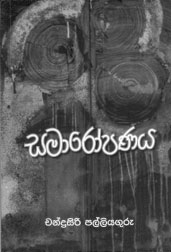 |
|
Samaropanaya
Author:
Prof. Chandrasiri Paliyaguru |
In reading 'Samaropanaya' I was strongly reminded of the above play,
however remotely it may be connected with 'The Birds'. The main
character is a victim of the tsunami that devastated the shores of Sri
Lanka in the year 2004. He is also fortunate enough to escape with
little injury. Being unconscious for a short period, he decides to
pretend that he had lost his memory through the experience. The
reactions and consequences lead him on to prolong the pretext. He had in
the outset, been fed up with the rat race of life. Not only the social
and the economical but also family wise as well. Tied down by duties and
responsibilities he sees the opportunity as an escape route.
He is a successful businessman with a beautiful devoted but busy wife
and two teenage children. A girl and a boy. He is educated but he had
come into money as well as the business world and comfortable life
through his wife. But while he enjoyed what life had offered him he is
fed up with the monotony of it. His business is looked after by an
efficient board of directors, the domestic front by his wife and
servants. As often in such situations he finds a distraction in the form
of a mistress. One may also describe this as a mid life crisis. After
the ‘illness’ he is confined to his home, therefore, he lives with the
mistress on every occasion he could, in his mind. The ‘pretext’ of
losing his memory enables him to enjoy his flights of fantasy while
enhancing him with the opportunity of saying and doing what he likes. -
to the extent of leaving home on his free will and living a few days in
the adulterous relation with his mistress, and returning.
The consequences that he finally has to face is that he is compelled
to return all his shares in the company, divorce his wife and leave his
home and children. The character is not completely a negative defeatist.
For he does foster hope of a new life, when he leaves home. A fresh
tomorrow.
When one examines the novel with the cultural social and moral
context in mind we are tempted to ask a question. The question is what
if all men and women plunge in to these voyages of freedom? Begin to
shake off all shackles of family and society? In the portrayal of this
character the main characteristic that we could observe is the extreme
ego centric selfishness. The character does not for a moment consider
the impact his actions may have on his dearest and the nearest. The
escapism, along with ready opportunities may come to any person in
society, irrespective of whether it is a woman or a man. And it is not
because one does not have an opportunity, nor the temptation that one
may not take action. It is careful consideration and the mindfulness of
the suffering one may cast on the innocent or the not so innocent at
that. For all are humans. But weaknesses of others is not an excuse for
some other to jeopardize all.
In this particular incident the legal wife realizes that she is
deprived of a healthy sexual relationship because of another woman in
her husband’s life. But she is ready to forget and forgive. However, the
‘play’ that the husband had staged for his benefit turns the tables on
him. According to him, he had passed wind as a jest, but at the end he
had ended up in his own excrement.
The writer does not condemn the character. But he makes him dream
again with the above realization in mind. Professor Palliyaguru leaves
his readers to surmise what might be instore for him in future. And the
probability is, getting back to The Birds of Aristophanes, that he might
make a mess of it as well. As for example how could his mistress believe
that he might not do the same to her, as he did to his wife and
children, when the monotony starts setting in? And how could he have
faith in a woman who could have an adulterous relationship with a man
who was married and had kids of his own? Another characteristic that one
could observe in him is that he is not ready to earn for a living. But
at the same time he is used to living a life of luxury and the freedom
that goes with it. To him it seems that life is only taking, with the
minimum of giving on his part.
The problem that the writer has tackled is quite apt in the modern
day of life. At the same time one is tempted to view the situation from
a psychological stand point. An average person may not have the leisure
to indulge in flights of fantasy. But something that one may face,
irrespective of economic, social or gender position are the illicit
affairs. And it is in the hands of thinking men to decide if he or she
is to mess it all up or not. Not only for himself but for others as
well.
The style of presentation is smooth and simple - deceptively simple
and very readable. However, one may wonder if the ‘impersonation ‘as
suggested in the title of the novel could be applied to the deception
carried out by the main character. At no time are the characters meanly
sketches. The characters are full of flesh and blood, living and breathy
in the 21st century. The novel excels in itself in the sense that it is
thought provoking without being propaganda, be it cultural or otherwise.
Poetry felt in the blood and heart
Reviewed by Dr. Lakshmi de Silva
It is the urgency of experience, the felt need to express a surge of
reaction to the Divine as well as the diurnal that gives distinction and
emotive force to Lynn Ockersz’s poetry. The lines spring not as
varta-kavi that record a moment of whimsy or pathos, nor from cerebral
choice, but anvilled in the heat and stress of strenuous active
engagement in confronting his inner self or contemporary society.
Harry Potter mesmeric lore thrown into
 |
|
The Peace Thou Gives
Author:
Lynn Ockersz |
War casualty tolls and cricket scores
Political gossip and superstar shows
The Poor Man’s Cocktail
The peace of the graveyard grates on the ear
It is not the Peace of Love Thou holds so dear
But an eerie stillness born of fear
Welling in hearts by worldly
Might brought to heel
As the Gun-Smoke Settles
The poet’s ear that makes a line echo and hold, not pass through a
reader’s mind, an awareness of the way language works is evident: to
that extent, Ockersz’s response to more than four years of being
immersed in literature and familiarising himself both as a student and
Visiting Lecturer with the work of Donne, Herbert and Eliot shows. It
accounts for a seasoned scholar’s delight in the first manifestation of
Ockersz’s abilities.
“Lyn Ockersz’s Christian religious poetry in Flame and Sparks (2003)
represents a new element in Sri Lankan poetry in English ... Ockersz’s
poetry is fresh, strong and convincing and is also free of echoes of
well-known Western religious poets”.
D.C.R.A. Goonetilleke in Sri Lankan English Literature and the Sri
Lankan People 1917-2003 also identifies the distinctive quality of
Ockersz’s early poetry succinctly.
“Its essence is controlled thought, an epigrammatic balancing of
ideas”.
It was this fusion of intense feeling and equable views that gave
both force and poise to the poems in Flame and Sparks but a new note has
developed in his new collection ‘The Peace Thou Gives’ - more confident
and consequently, occasionally less solemn, capable of using a lighter
tone to accommodate the sardonic and satirical vein. Where the poem
centres on religion, however the fervour is undiminished. One may not be
able to accept Ockersz’s tenets but the deep sincerity manifestly ‘felt
in the blood and felt along the heart’ to quote Wordsworth’s
irreplaceable line cannot but make the reader share his feelings at the
moment of reading, as is the case with Maker and the Mould and ‘The
Peace Thou Gives’.
Flame and Sparks voiced an impressive commitment to social justice;
the preface to ‘The Peace Thou Gives’ states “I hope I have succeeded
... in giving to my poems a substantial local socio-political dimension
and topicality”.
Far from being ‘an artificial implant’, the element which another
critic perceptively identified as ‘social responsibility’ impels Ockersz
to express himself in poetry as well as the religious impulse to glorify
his God. In the poet’s vision the two are inseparable. The true measure
of Ockersz’s achievement lies in his ability to convey his sense of the
operation of the Divine Will to readers whose understanding of
Christianity is derived solely from English literature, through the
medium of language and rhythm. Yeats wrote of “the craft of verse” and
even if Ockersz had not significantly used the word “crafted” in his
preface, it is apparent that he is not of the hit-or-miss school of
poetasters. Clarity of imagery, firmness of structure emphasised by an
unforced and unobtrusive use of rhyme and an awareness that “the ear is
the true reader” gives many of his poems the power of lodging in the
memory, for instance
The Miscarriage
The world comes crashing down on the powerless
Because some trembling hands cannot weigh evenly And obey the Call of
Conscience coming from Eternity
But would prefer to heed
Hades cold prompting
And choose safety of self,
Position and pelf ...
Ghost Writer too has its appeal, as Ockersz deftly playing on a term
older than Holy Spirit, the Holy Ghost unhesitatingly and unerringly
places a small plain word that is full of meaning at a prominent point
Am I not like Moses who felt
Small before Thy Writ
But Thou his spirit did lift
I too look to Thee O giver of grit.
Embellished as it is with miniature pictures not always entirely in
keeping with the starkness of some of the poems, but charming in
themselves, the slim book is likely to prove a popular Christmas gift to
favoured friends because of its furtherance of their faith. For those
who may echo Yeats
“Homer is my example and his unchristened heart” it may promote
discussion of societal dysfunction or the dynamics of poetry.
BOOK LAUNCH
Sathyam Sivam Sundaram
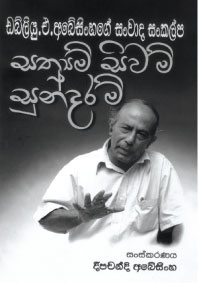
Deepachandi Abeysinghe’s 'Sathyam Sivam Sundaram' will be launched at
the Town Hall auditorium Kuliyapitiya on November 4 at 2.30 pm.
The book is a Samudra publication.
Sinhala Hodiya Denagan Indura

Prof. Bandusena Gunasekara’s latest book “Sinhala Hodiya Denagan
Indura” will be launched at Dayawansa Jayakody Bookshop, Ven S. Mahinda
Mawatha, Colombo 10 on November 2 at 10 a.m.
Prof. Gunasekara is the author of several other books such as
‘Suvanda Patha Nala - Veera Dutugemunu’ “Vimukthi Sangramaye Niyamuva -
Senadhipathi Nandimithra” ‘Veera Gajabahu’, ‘Subahu hevath Mahaneela’,
‘Gajaba Puvatha’ and ‘Kavanthissa Rajathuma’. “Sinhala Hodiya Denagan
Indura” is a Dayawansa Jayakody publication.
NEW ARRIVALS
Thibbatha Diyaniya
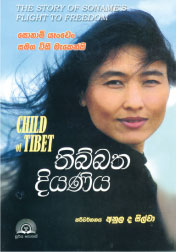
Anula de Silva’s ‘Thibbatha Diyaniya’ is the authentic Sinhala
translation of Sonami Tancheng and Vickie Mackensi’s “The story of
Soname’s flight to freedom entitled Child of Tibet”.
The book is published by Sooriya Publishers, Colombo 10.
Leda Suvakarana Reiki
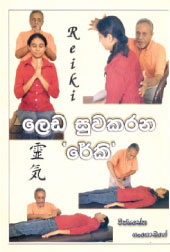
Wijayasena Gangodage’s ‘Leda Suvakarana ‘Reiki’ introduces a new
healing method which was practised in India and Tibet for a long time.
Reiki has a strong emphasis on meditation.
The author has undergone extensive training under Dr. Ranga
Premaratne who is a well-known Reiki Master. The book explains what
Reiki is and gives its history.
The healing method using universal energy was first used by the
Chinese. It was called ‘Chi’. Later it spread to Japan under the tittle
‘Ki’. The same method is used in India as ‘Prana’. The current term
‘Reiki’ had its origin in Japan.
‘Leda Suvakarana Reiki’ is a Shikshamandira Publication. RS.
Mage Kathava Bill Clinton
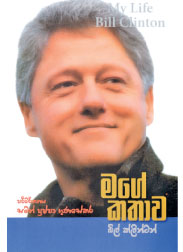
Saman Pushpa Gunasekara’s ‘Mage Kathava Bill Clinton’ is the
authentic Sinhala translation of ‘My Life Bill Clinton’. The book gives
a graphic account of President Bill Clinton of the United States.
His autobiography gives inspiration to politicians, students of
political science and the general reader.
‘Mage Kathava Bill Clinton’ is a Sarasavi publication. |

